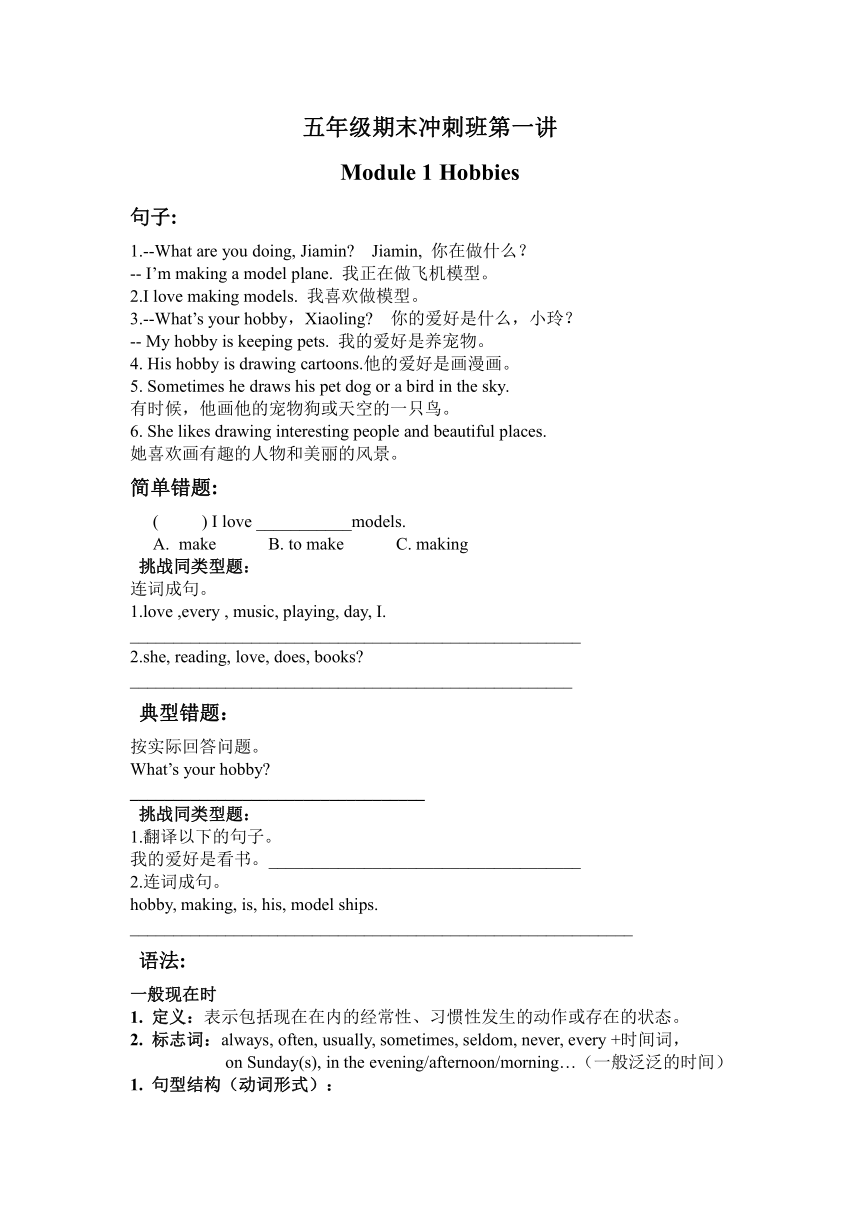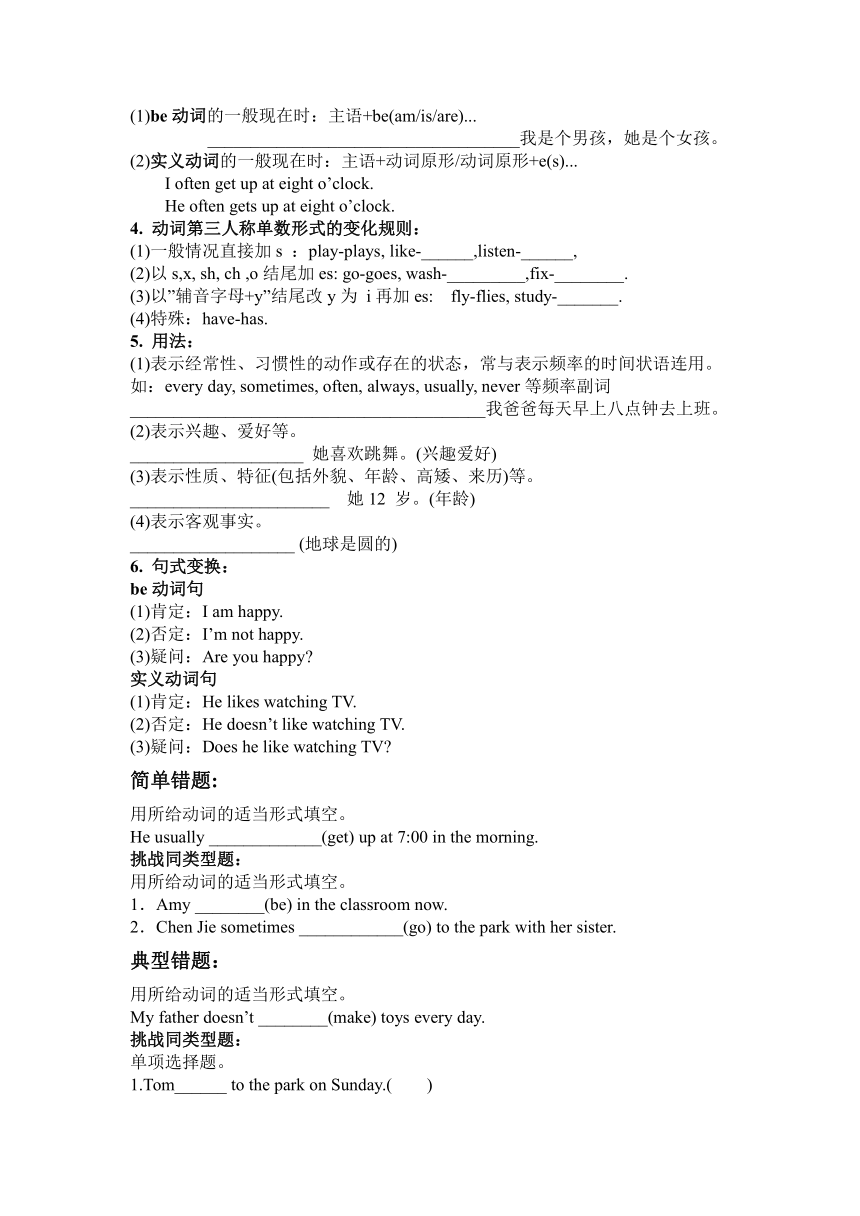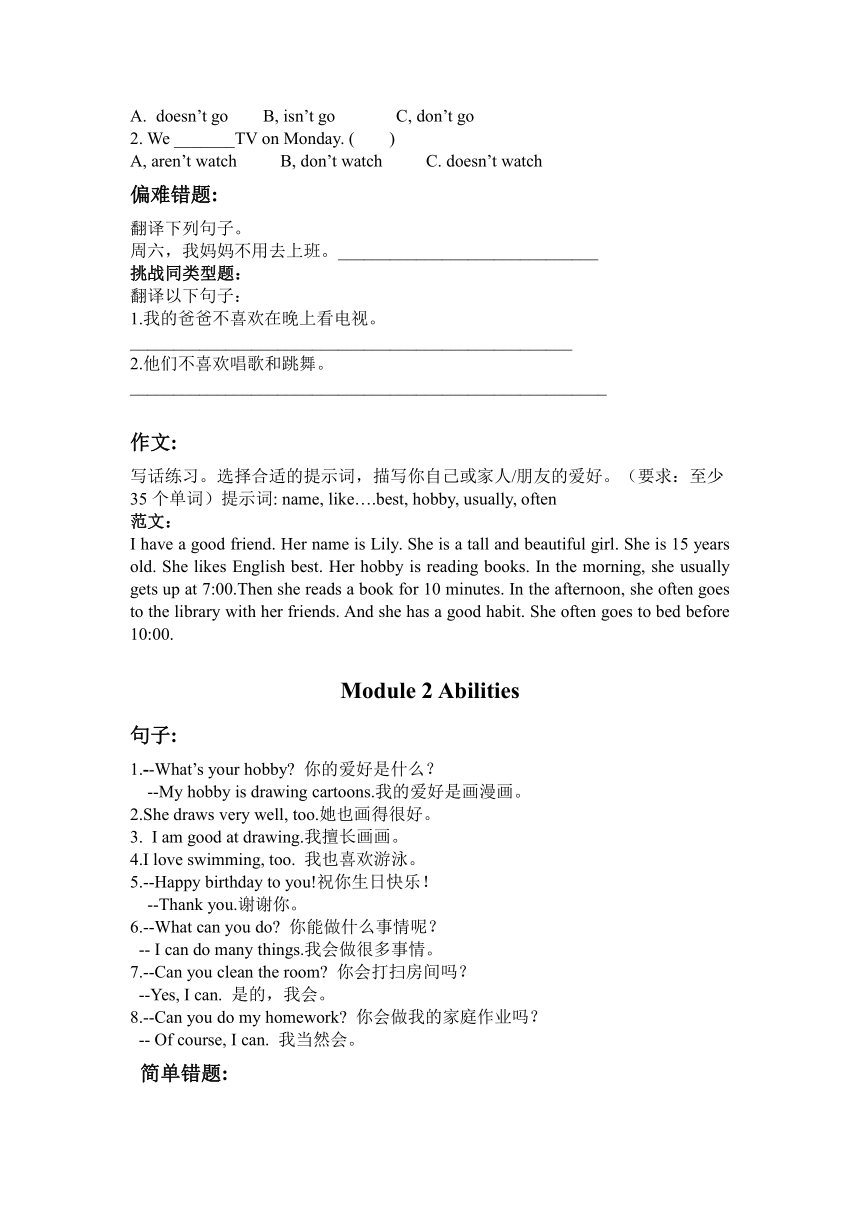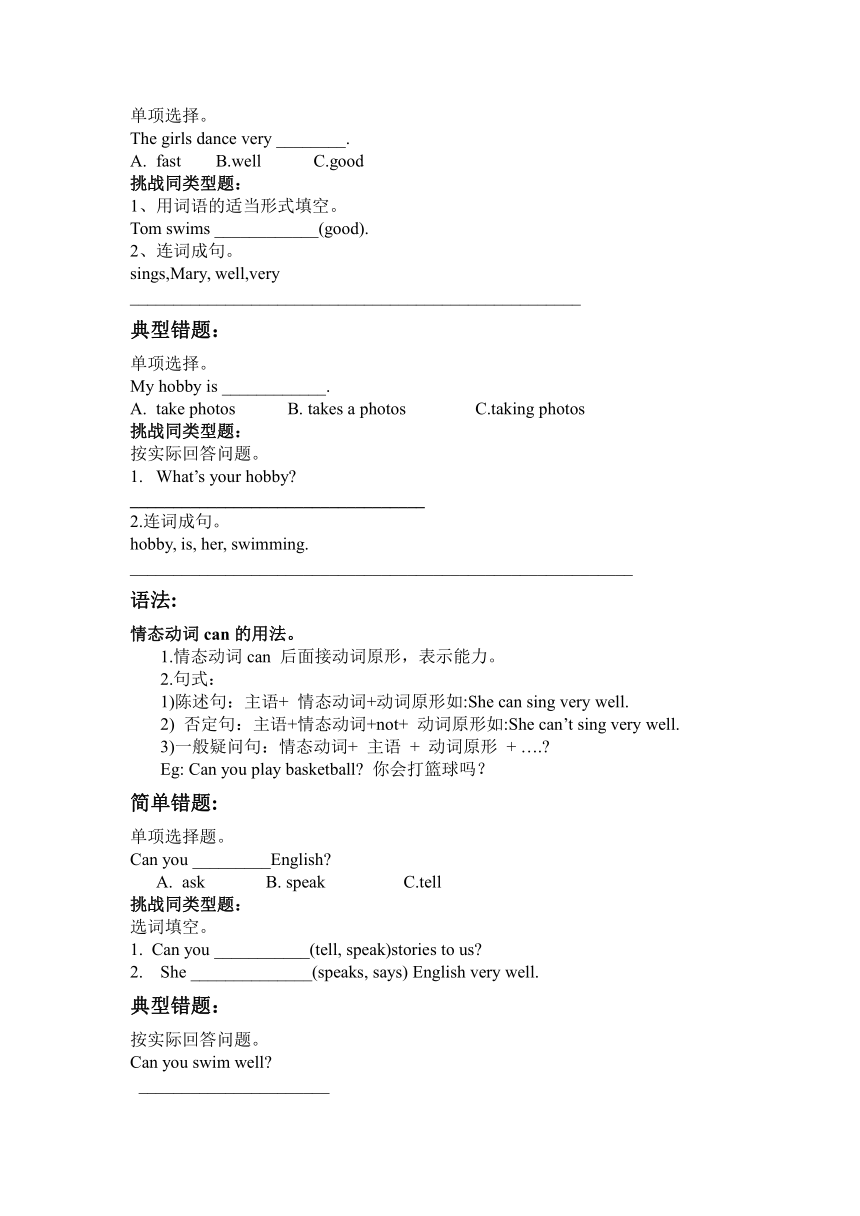教科版(广州)英语五年级上册 Module 1-3 讲义+练习(无答案)
文档属性
| 名称 | 教科版(广州)英语五年级上册 Module 1-3 讲义+练习(无答案) |

|
|
| 格式 | docx | ||
| 文件大小 | 31.0KB | ||
| 资源类型 | 教案 | ||
| 版本资源 | 教科版(广州) | ||
| 科目 | 英语 | ||
| 更新时间 | 2023-08-16 07:51:51 | ||
图片预览




文档简介
五年级期末冲刺班第一讲
Module 1 Hobbies
句子:
1.--What are you doing, Jiamin Jiamin, 你在做什么?
-- I’m making a model plane. 我正在做飞机模型。
2.I love making models. 我喜欢做模型。
3.--What’s your hobby,Xiaoling 你的爱好是什么,小玲?
-- My hobby is keeping pets. 我的爱好是养宠物。
4. His hobby is drawing cartoons.他的爱好是画漫画。
5. Sometimes he draws his pet dog or a bird in the sky.
有时候,他画他的宠物狗或天空的一只鸟。
6. She likes drawing interesting people and beautiful places.
她喜欢画有趣的人物和美丽的风景。
简单错题:
( ) I love ___________models.
make B. to make C. making
挑战同类型题:
连词成句。
1.love ,every , music, playing, day, I.
____________________________________________________
2.she, reading, love, does, books
___________________________________________________
典型错题:
按实际回答问题。
What’s your hobby
__________________________________
挑战同类型题:
1.翻译以下的句子。
我的爱好是看书。____________________________________
2.连词成句。
hobby, making, is, his, model ships.
__________________________________________________________
语法:
一般现在时
1. 定义:表示包括现在在内的经常性、习惯性发生的动作或存在的状态。
2. 标志词:always, often, usually, sometimes, seldom, never, every +时间词,
on Sunday(s), in the evening/afternoon/morning…(一般泛泛的时间)
句型结构(动词形式):
(1)be动词的一般现在时:主语+be(am/is/are)...
____________________________________我是个男孩,她是个女孩。
(2)实义动词的一般现在时:主语+动词原形/动词原形+e(s)...
I often get up at eight o’clock.
He often gets up at eight o’clock.
4. 动词第三人称单数形式的变化规则:
(1)一般情况直接加s :play-plays, like-______,listen-______,
(2)以s,x, sh, ch ,o结尾加es: go-goes, wash-_________,fix-________.
(3)以”辅音字母+y”结尾改y为 i再加es: fly-flies, study-_______.
(4)特殊:have-has.
5. 用法:
(1)表示经常性、习惯性的动作或存在的状态,常与表示频率的时间状语连用。如:every day, sometimes, often, always, usually, never等频率副词_________________________________________我爸爸每天早上八点钟去上班。
(2)表示兴趣、爱好等。
____________________ 她喜欢跳舞。(兴趣爱好)
(3)表示性质、特征(包括外貌、年龄、高矮、来历)等。
_______________________ 她12 岁。(年龄)
(4)表示客观事实。
___________________ (地球是圆的)
6. 句式变换:
be动词句
(1)肯定:I am happy.
(2)否定:I’m not happy.
(3)疑问:Are you happy
实义动词句
(1)肯定:He likes watching TV.
(2)否定:He doesn’t like watching TV.
(3)疑问:Does he like watching TV
简单错题:
用所给动词的适当形式填空。
He usually _____________(get) up at 7:00 in the morning.
挑战同类型题:
用所给动词的适当形式填空。
1.Amy ________(be) in the classroom now.
2.Chen Jie sometimes ____________(go) to the park with her sister.
典型错题:
用所给动词的适当形式填空。
My father doesn’t ________(make) toys every day.
挑战同类型题:
单项选择题。
1.Tom______ to the park on Sunday.( )
doesn’t go B, isn’t go C, don’t go
2. We _______TV on Monday. ( )
A, aren’t watch B, don’t watch C. doesn’t watch
偏难错题:
翻译下列句子。
周六,我妈妈不用去上班。______________________________
挑战同类型题:
翻译以下句子:
1.我的爸爸不喜欢在晚上看电视。___________________________________________________
2.他们不喜欢唱歌和跳舞。_______________________________________________________
作文:
写话练习。选择合适的提示词,描写你自己或家人/朋友的爱好。(要求:至少35个单词)提示词: name, like….best, hobby, usually, often
范文:
I have a good friend. Her name is Lily. She is a tall and beautiful girl. She is 15 years old. She likes English best. Her hobby is reading books. In the morning, she usually gets up at 7:00.Then she reads a book for 10 minutes. In the afternoon, she often goes to the library with her friends. And she has a good habit. She often goes to bed before 10:00.
Module 2 Abilities
句子:
--What’s your hobby 你的爱好是什么?
--My hobby is drawing cartoons.我的爱好是画漫画。
She draws very well, too.她也画得很好。
I am good at drawing.我擅长画画。
I love swimming, too. 我也喜欢游泳。
--Happy birthday to you!祝你生日快乐!
--Thank you.谢谢你。
--What can you do 你能做什么事情呢?
-- I can do many things.我会做很多事情。
--Can you clean the room 你会打扫房间吗?
--Yes, I can. 是的,我会。
--Can you do my homework 你会做我的家庭作业吗?
-- Of course, I can. 我当然会。
简单错题:
单项选择。
The girls dance very ________.
fast B.well C.good
挑战同类型题:
1、用词语的适当形式填空。
Tom swims ____________(good).
2、连词成句。
sings,Mary, well,very
____________________________________________________
典型错题:
单项选择。
My hobby is ____________.
take photos B. takes a photos C.taking photos
挑战同类型题:
按实际回答问题。
What’s your hobby
__________________________________
2.连词成句。
hobby, is, her, swimming.
__________________________________________________________
语法:
情态动词can的用法。
1.情态动词can 后面接动词原形,表示能力。
2.句式:
1)陈述句:主语+ 情态动词+动词原形如:She can sing very well.
2) 否定句:主语+情态动词+not+ 动词原形如:She can’t sing very well.
3)一般疑问句:情态动词+ 主语 + 动词原形 + ….
Eg: Can you play basketball 你会打篮球吗?
简单错题:
单项选择题。
Can you _________English
ask B. speak C.tell
挑战同类型题:
选词填空。
Can you ___________(tell, speak)stories to us
She ______________(speaks, says) English very well.
典型错题:
按实际回答问题。
Can you swim well
______________________
挑战同类型题:
1.单项选择题。
( )The cat______.
can’t swim B, isn’t swim C, can’t swimming
2.翻译句子。
你会干家务活吗?
______________________________
偏难错题
翻译下列句子。
你会说法语吗?
挑战同类型题:
翻译以下句子:
1.你的朋友会讲故事吗?__________________________________________________________
2.李小姐不会游泳。_______________________________________________________________
作文:
写话练习,叙述你喜欢的人或动物会(can’t)做或不会(can’t)做的事情。(要求:至少35个单词。
范文:The cat is my favorite animal. It has four legs and two big round eyes. It can walk. It can run and climb trees. It can catch mice. But it can’t fly and swim. And it likes eating fish best. I like it very much.
Module3 Daily Life
句子:
1.-Where is Ben Ben在哪里?
-He is at the swimming pool. 他在游泳池里。
He never goes swimming on weekdays.他从不在工作日去游泳。
-Does Ben often go swimming Ben经常去游泳吗?
-Yes, he does. 是的,他经常去。
-Let me go and look for him there.我去那里找找他吧。
-OK.好吧。
5. The Chen family is always very busy at the weekend.陈家人在周末总是很忙。
6.After breakfast Mrs Chen usually goes to the market with Mr Chen.
早餐后,陈太太常常和陈先生一起去市场。
Their son Jiamin always goes to the Children’s Palace on Saturday.
他们的儿子Jiamin周六总是去少年宫。
简单错题:
根据中文意思,把下列句子补充完整。
She will go there _____________(在工作日).
挑战同类型题:
用适当的介词填空。
Tom usually goes to the library _________ Sunday.
When are you free ______a week
典型错题:
翻译下列句子。
1.陈家人在周末总是很忙。______________________________________
挑战同类型题:
1.用动词的正确形式填空。
Every family _________(have) his own trouble.
2.翻译下列句子。
在周末,张家人经常坐在一起聊天。
_____________________________________
语法:
一般现在时
定义:表示包括现在在内的经常性、习惯性发生的动作或存在的状态。
标志词:
always, often, usually, sometimes, seldom, never, every +时间, on Sunday
He goes to the Children’s Palace on Sunday.周日,他经常去少年宫。
She seldom goes to the library.她很少去图书馆。
Mary never helps her mother do housework.玛丽从不帮她妈妈做家务活。 .
3、第三人称单数主语:(主语为三单,动词用三单形式)
she he it
Lucy my motherLucy’s sister Mr Wang my brother the little boy my school the dog her bag
She usually goes to the Children’s Palace on Saturday. 周六,她经常去少年宫。
He often gets up very early in the morning.早上,他经常很早起床。
The dog jumps very fast. 它跳得好快。
Lucy has a good friend. Lucy 有一个好朋友。
My mother usually cooks for us in the morning. 早上,我妈妈经常煮早餐给我们。
Mr. Zhang teaches Math in the school. 张先生在这所学校教数学。
4、动词形式和句型结构:
(1)be动词的一般现在时:主语+be(am/is/are)...
She is a good student.她是一个好学生。
She isn’t a good student.她不是一个好学生。
Is she a good student 她是一个好学生吗?.
(2)实义动词的一般现在时:主语+动词原形+e(s)...
He often watches TV at night.他晚上经常看电视。
He doesn’t watch TV at night.他晚上不看电视。
Does he often watch TV at night 他晚上经常看电视吗?
5、动词三单形式的变化规则:
(1)一般动词——词尾+s :play-plays, sit-sits;
(2)以s,x, sh, ch ,o结尾的动词加es: go-goes, watch-watches ;
(3)以”辅音字母+y”结尾的动词,把y改i再加es: fly-flies, cry-cries;
(4)特殊:have-has
简单错题:
用动词的适当形式填空。
My brother usually __________ (have ) breakfast at 7:00 in the morning.
挑战同类型题:
用动词的适当形式填空。
Mrs Chen _________(go) to the library every afternoon.
Jiamin usually __________(play) chess with his classmate every afternoon.
典型错题:
按实际回答问题。
What does your father do in the evening ___________________________________
挑战同类型题:
按实际回答问题。
What does your sister do on Sunday _______________________________
Does Ben often go swimming _______________________
偏难错题:
翻译下列句子。
他有时去和他朋友打篮球。
___________________________________________
挑战同类型题:
根据中文意思把句子补充完整:
1.他通常很早醒来。He always ______ _____ very early.
2. Kim想去外面吃午餐。Kim _____ ____ _____ ______ for lunch.
作文:
写一段话,叙述你家里人的日常生活。(要求:至少35个单词。)
范文:
Hello, my name is Zhang wei. I’m a Chinese girl. There are 3 people in my family, my parents and I. We are always very busy. My parents go to work at 8:00 on weekdays. And I go to school from Monday to Friday. Sometimes they drive me to school. My family is always busy on Sunday. In the morning, my mother always cooks for us. And my father often cleans his car. They usually go to the cinema in the afternoon. I often go to the Children’s Palace to have classes on Sunday. I have an art class in the morning and a musical class in the afternoon. In the evening, we usually sit together to have a talk.
Module 1 Hobbies
句子:
1.--What are you doing, Jiamin Jiamin, 你在做什么?
-- I’m making a model plane. 我正在做飞机模型。
2.I love making models. 我喜欢做模型。
3.--What’s your hobby,Xiaoling 你的爱好是什么,小玲?
-- My hobby is keeping pets. 我的爱好是养宠物。
4. His hobby is drawing cartoons.他的爱好是画漫画。
5. Sometimes he draws his pet dog or a bird in the sky.
有时候,他画他的宠物狗或天空的一只鸟。
6. She likes drawing interesting people and beautiful places.
她喜欢画有趣的人物和美丽的风景。
简单错题:
( ) I love ___________models.
make B. to make C. making
挑战同类型题:
连词成句。
1.love ,every , music, playing, day, I.
____________________________________________________
2.she, reading, love, does, books
___________________________________________________
典型错题:
按实际回答问题。
What’s your hobby
__________________________________
挑战同类型题:
1.翻译以下的句子。
我的爱好是看书。____________________________________
2.连词成句。
hobby, making, is, his, model ships.
__________________________________________________________
语法:
一般现在时
1. 定义:表示包括现在在内的经常性、习惯性发生的动作或存在的状态。
2. 标志词:always, often, usually, sometimes, seldom, never, every +时间词,
on Sunday(s), in the evening/afternoon/morning…(一般泛泛的时间)
句型结构(动词形式):
(1)be动词的一般现在时:主语+be(am/is/are)...
____________________________________我是个男孩,她是个女孩。
(2)实义动词的一般现在时:主语+动词原形/动词原形+e(s)...
I often get up at eight o’clock.
He often gets up at eight o’clock.
4. 动词第三人称单数形式的变化规则:
(1)一般情况直接加s :play-plays, like-______,listen-______,
(2)以s,x, sh, ch ,o结尾加es: go-goes, wash-_________,fix-________.
(3)以”辅音字母+y”结尾改y为 i再加es: fly-flies, study-_______.
(4)特殊:have-has.
5. 用法:
(1)表示经常性、习惯性的动作或存在的状态,常与表示频率的时间状语连用。如:every day, sometimes, often, always, usually, never等频率副词_________________________________________我爸爸每天早上八点钟去上班。
(2)表示兴趣、爱好等。
____________________ 她喜欢跳舞。(兴趣爱好)
(3)表示性质、特征(包括外貌、年龄、高矮、来历)等。
_______________________ 她12 岁。(年龄)
(4)表示客观事实。
___________________ (地球是圆的)
6. 句式变换:
be动词句
(1)肯定:I am happy.
(2)否定:I’m not happy.
(3)疑问:Are you happy
实义动词句
(1)肯定:He likes watching TV.
(2)否定:He doesn’t like watching TV.
(3)疑问:Does he like watching TV
简单错题:
用所给动词的适当形式填空。
He usually _____________(get) up at 7:00 in the morning.
挑战同类型题:
用所给动词的适当形式填空。
1.Amy ________(be) in the classroom now.
2.Chen Jie sometimes ____________(go) to the park with her sister.
典型错题:
用所给动词的适当形式填空。
My father doesn’t ________(make) toys every day.
挑战同类型题:
单项选择题。
1.Tom______ to the park on Sunday.( )
doesn’t go B, isn’t go C, don’t go
2. We _______TV on Monday. ( )
A, aren’t watch B, don’t watch C. doesn’t watch
偏难错题:
翻译下列句子。
周六,我妈妈不用去上班。______________________________
挑战同类型题:
翻译以下句子:
1.我的爸爸不喜欢在晚上看电视。___________________________________________________
2.他们不喜欢唱歌和跳舞。_______________________________________________________
作文:
写话练习。选择合适的提示词,描写你自己或家人/朋友的爱好。(要求:至少35个单词)提示词: name, like….best, hobby, usually, often
范文:
I have a good friend. Her name is Lily. She is a tall and beautiful girl. She is 15 years old. She likes English best. Her hobby is reading books. In the morning, she usually gets up at 7:00.Then she reads a book for 10 minutes. In the afternoon, she often goes to the library with her friends. And she has a good habit. She often goes to bed before 10:00.
Module 2 Abilities
句子:
--What’s your hobby 你的爱好是什么?
--My hobby is drawing cartoons.我的爱好是画漫画。
She draws very well, too.她也画得很好。
I am good at drawing.我擅长画画。
I love swimming, too. 我也喜欢游泳。
--Happy birthday to you!祝你生日快乐!
--Thank you.谢谢你。
--What can you do 你能做什么事情呢?
-- I can do many things.我会做很多事情。
--Can you clean the room 你会打扫房间吗?
--Yes, I can. 是的,我会。
--Can you do my homework 你会做我的家庭作业吗?
-- Of course, I can. 我当然会。
简单错题:
单项选择。
The girls dance very ________.
fast B.well C.good
挑战同类型题:
1、用词语的适当形式填空。
Tom swims ____________(good).
2、连词成句。
sings,Mary, well,very
____________________________________________________
典型错题:
单项选择。
My hobby is ____________.
take photos B. takes a photos C.taking photos
挑战同类型题:
按实际回答问题。
What’s your hobby
__________________________________
2.连词成句。
hobby, is, her, swimming.
__________________________________________________________
语法:
情态动词can的用法。
1.情态动词can 后面接动词原形,表示能力。
2.句式:
1)陈述句:主语+ 情态动词+动词原形如:She can sing very well.
2) 否定句:主语+情态动词+not+ 动词原形如:She can’t sing very well.
3)一般疑问句:情态动词+ 主语 + 动词原形 + ….
Eg: Can you play basketball 你会打篮球吗?
简单错题:
单项选择题。
Can you _________English
ask B. speak C.tell
挑战同类型题:
选词填空。
Can you ___________(tell, speak)stories to us
She ______________(speaks, says) English very well.
典型错题:
按实际回答问题。
Can you swim well
______________________
挑战同类型题:
1.单项选择题。
( )The cat______.
can’t swim B, isn’t swim C, can’t swimming
2.翻译句子。
你会干家务活吗?
______________________________
偏难错题
翻译下列句子。
你会说法语吗?
挑战同类型题:
翻译以下句子:
1.你的朋友会讲故事吗?__________________________________________________________
2.李小姐不会游泳。_______________________________________________________________
作文:
写话练习,叙述你喜欢的人或动物会(can’t)做或不会(can’t)做的事情。(要求:至少35个单词。
范文:The cat is my favorite animal. It has four legs and two big round eyes. It can walk. It can run and climb trees. It can catch mice. But it can’t fly and swim. And it likes eating fish best. I like it very much.
Module3 Daily Life
句子:
1.-Where is Ben Ben在哪里?
-He is at the swimming pool. 他在游泳池里。
He never goes swimming on weekdays.他从不在工作日去游泳。
-Does Ben often go swimming Ben经常去游泳吗?
-Yes, he does. 是的,他经常去。
-Let me go and look for him there.我去那里找找他吧。
-OK.好吧。
5. The Chen family is always very busy at the weekend.陈家人在周末总是很忙。
6.After breakfast Mrs Chen usually goes to the market with Mr Chen.
早餐后,陈太太常常和陈先生一起去市场。
Their son Jiamin always goes to the Children’s Palace on Saturday.
他们的儿子Jiamin周六总是去少年宫。
简单错题:
根据中文意思,把下列句子补充完整。
She will go there _____________(在工作日).
挑战同类型题:
用适当的介词填空。
Tom usually goes to the library _________ Sunday.
When are you free ______a week
典型错题:
翻译下列句子。
1.陈家人在周末总是很忙。______________________________________
挑战同类型题:
1.用动词的正确形式填空。
Every family _________(have) his own trouble.
2.翻译下列句子。
在周末,张家人经常坐在一起聊天。
_____________________________________
语法:
一般现在时
定义:表示包括现在在内的经常性、习惯性发生的动作或存在的状态。
标志词:
always, often, usually, sometimes, seldom, never, every +时间, on Sunday
He goes to the Children’s Palace on Sunday.周日,他经常去少年宫。
She seldom goes to the library.她很少去图书馆。
Mary never helps her mother do housework.玛丽从不帮她妈妈做家务活。 .
3、第三人称单数主语:(主语为三单,动词用三单形式)
she he it
Lucy my motherLucy’s sister Mr Wang my brother the little boy my school the dog her bag
She usually goes to the Children’s Palace on Saturday. 周六,她经常去少年宫。
He often gets up very early in the morning.早上,他经常很早起床。
The dog jumps very fast. 它跳得好快。
Lucy has a good friend. Lucy 有一个好朋友。
My mother usually cooks for us in the morning. 早上,我妈妈经常煮早餐给我们。
Mr. Zhang teaches Math in the school. 张先生在这所学校教数学。
4、动词形式和句型结构:
(1)be动词的一般现在时:主语+be(am/is/are)...
She is a good student.她是一个好学生。
She isn’t a good student.她不是一个好学生。
Is she a good student 她是一个好学生吗?.
(2)实义动词的一般现在时:主语+动词原形+e(s)...
He often watches TV at night.他晚上经常看电视。
He doesn’t watch TV at night.他晚上不看电视。
Does he often watch TV at night 他晚上经常看电视吗?
5、动词三单形式的变化规则:
(1)一般动词——词尾+s :play-plays, sit-sits;
(2)以s,x, sh, ch ,o结尾的动词加es: go-goes, watch-watches ;
(3)以”辅音字母+y”结尾的动词,把y改i再加es: fly-flies, cry-cries;
(4)特殊:have-has
简单错题:
用动词的适当形式填空。
My brother usually __________ (have ) breakfast at 7:00 in the morning.
挑战同类型题:
用动词的适当形式填空。
Mrs Chen _________(go) to the library every afternoon.
Jiamin usually __________(play) chess with his classmate every afternoon.
典型错题:
按实际回答问题。
What does your father do in the evening ___________________________________
挑战同类型题:
按实际回答问题。
What does your sister do on Sunday _______________________________
Does Ben often go swimming _______________________
偏难错题:
翻译下列句子。
他有时去和他朋友打篮球。
___________________________________________
挑战同类型题:
根据中文意思把句子补充完整:
1.他通常很早醒来。He always ______ _____ very early.
2. Kim想去外面吃午餐。Kim _____ ____ _____ ______ for lunch.
作文:
写一段话,叙述你家里人的日常生活。(要求:至少35个单词。)
范文:
Hello, my name is Zhang wei. I’m a Chinese girl. There are 3 people in my family, my parents and I. We are always very busy. My parents go to work at 8:00 on weekdays. And I go to school from Monday to Friday. Sometimes they drive me to school. My family is always busy on Sunday. In the morning, my mother always cooks for us. And my father often cleans his car. They usually go to the cinema in the afternoon. I often go to the Children’s Palace to have classes on Sunday. I have an art class in the morning and a musical class in the afternoon. In the evening, we usually sit together to have a talk.
同课章节目录
- Module 1 Hobbies
- Unit 1 What's your hobby?
- Unit 2 His hobby is drawing
- Module 2 Abilities
- Unit 3 I can swim very fast
- Unit 4 Can you do homework?
- Module 3 Daily life
- Unit 5 Where is Ben?
- Unit 6 At the weekend
- Module 4 Foods and drinks
- Unit 7 Do you want coffee or tea?
- Unit 8 Let's have both
- Module 5 Foods we need
- Unit 9 It smells delicious
- Unit 10 Different tastes
- Module 6 Weathe
- Unit 11 What's the weather like today?
- Unit 12 Four seasons in one day
- Module 7 Let's look back
